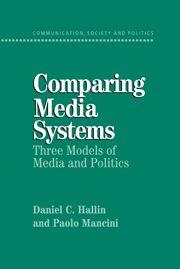Book contents
- Frontmatter
- Contents
- List of Figures and Tables
- List of Acronyms
- Preface
- 1 Introduction
- Part I Concepts and Models
- 2 Comparing Media Systems
- 3 The Political Context of Media Systems
- 4 Media and Political Systems, and the Question of Differentiation
- Part II The Three Models
- Part III The Future of the Three Models
- Bibliography
- Index
3 - The Political Context of Media Systems
Published online by Cambridge University Press: 05 September 2012
- Frontmatter
- Contents
- List of Figures and Tables
- List of Acronyms
- Preface
- 1 Introduction
- Part I Concepts and Models
- 2 Comparing Media Systems
- 3 The Political Context of Media Systems
- 4 Media and Political Systems, and the Question of Differentiation
- Part II The Three Models
- Part III The Future of the Three Models
- Bibliography
- Index
Summary
In Chapter 1 we argued that media systems are shaped by the wider context of political history, structure, and culture. In this section we will discuss some of the principal characteristics of political systems that can influence the structure of media institutions. We have taken from the literatures on comparative politics and political sociology a number of concepts that we believe are useful for understanding the evolution of media systems. We summarize these concepts relatively briefly here – and apologize to specialists in these fields for what may seem like an overly elementary discussion, and at the same time to media scholars unfamiliar with them for what may seem like an overly quick one. We hope that for both groups, the discussion will deepen and the meaning of the concepts will become clearer as we go on to apply them to the analysis of concrete cases. We also outline in this chapter a set of hypotheses that emerge from our research about how these political system variables are connected with the media system variables introduced in the preceding chapter. In the final section of this chapter we introduce an argument that common historical roots shape the development of both media and political systems, and are crucial to understanding the relation between the two. All the arguments introduced here are developed at greater length as we analyze the evolution of particular systems.
Information
- Type
- Chapter
- Information
- Comparing Media SystemsThree Models of Media and Politics, pp. 46 - 65Publisher: Cambridge University PressPrint publication year: 2004
